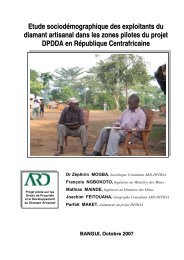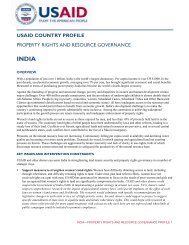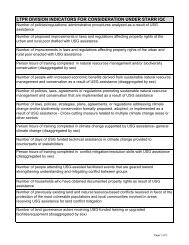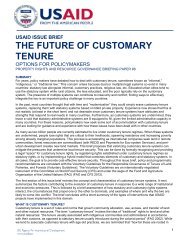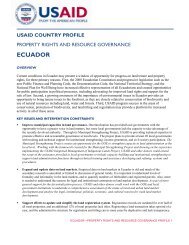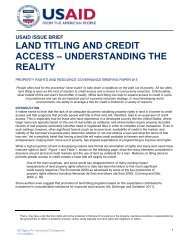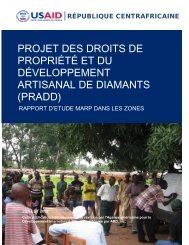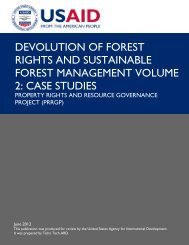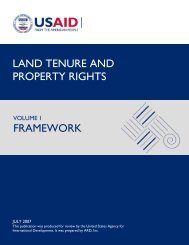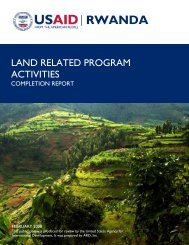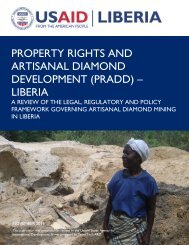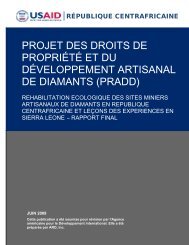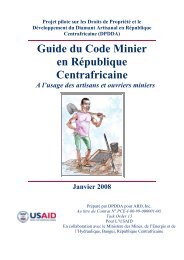positioned <strong>the</strong>mselves to prepare for formalization <strong>of</strong> <strong>the</strong>ir <strong>property</strong> claims vis-à-vis compet<strong>in</strong>g groups. The<strong>in</strong>itiative has stalled several times <strong>in</strong> <strong>the</strong> face <strong>of</strong> <strong>the</strong> complex technological, f<strong>in</strong>ancial and o<strong>the</strong>r <strong>resource</strong>requirements to fully implement a system to formalize customary <strong>rights</strong>. At <strong>the</strong> same time conflicts surfacedbased on <strong>the</strong> multiple claims <strong>in</strong>herent <strong>in</strong> most customary systems. While potentially laudable undertak<strong>in</strong>g, itcould also be argued that Niger’s Rural Code process is both overly ambitious and somewhat misguided <strong>in</strong>attempt<strong>in</strong>g a wholesale formalization multiple, overlapp<strong>in</strong>g and diverse <strong>property</strong> claims. That <strong>in</strong>itiative runs<strong>the</strong> risk <strong>of</strong> petrify<strong>in</strong>g <strong>the</strong> exist<strong>in</strong>g (or manipulated) pattern <strong>of</strong> land and <strong>resource</strong> <strong>rights</strong> by perhaps <strong>in</strong>advertently,driv<strong>in</strong>g up <strong>the</strong> transactions costs <strong>of</strong> adaptation. 16 If <strong>the</strong> only way to modify exist<strong>in</strong>g allocations <strong>of</strong> <strong>rights</strong> <strong>in</strong> <strong>the</strong> face <strong>of</strong>chang<strong>in</strong>g economic, political and sociological circumstances (e.g., <strong>the</strong> impact <strong>of</strong> <strong>the</strong> HIV/AIDS pandemic) isto redo <strong>the</strong> Rural Code, <strong>the</strong>n this <strong>in</strong>itiative will very likely reduce flexibility <strong>in</strong> land and <strong>natural</strong> <strong>resource</strong> tenurearrangements that might arguably be characterized as a s<strong>in</strong>e qua non <strong>of</strong> survival <strong>in</strong> a very harsh desert-edgeenvironment. These aspects are both complex and non-trivial. Program designers are advised to bear <strong>the</strong>se <strong>in</strong>m<strong>in</strong>d because failure to do so can wreak havoc with <strong>in</strong>stitutional arrangements that have helped generations<strong>of</strong> people survive <strong>in</strong> bleak, apparently impoverished environments across <strong>the</strong> globe.In contrast to Niger’s <strong>in</strong>itiative to produce a comprehensive Rural Code, a project supported effort <strong>in</strong> Gu<strong>in</strong>ea<strong>in</strong>troduced <strong>the</strong> concept and tool <strong>of</strong> written tenure contracts as a first step toward formalization <strong>of</strong> exist<strong>in</strong>g <strong>rights</strong>between landowners and land borrowers. 17 In a completely voluntary program, <strong>in</strong>troduction <strong>of</strong> tenurecontracts was proposed on <strong>the</strong> assumption that it was <strong>in</strong> <strong>the</strong> <strong>in</strong>terest <strong>of</strong> both borrower and owner to def<strong>in</strong>eand formalize a lend<strong>in</strong>g period and any o<strong>the</strong>r conditions perta<strong>in</strong><strong>in</strong>g to <strong>the</strong> land loan. Often a landownerlacked <strong>the</strong> labor to work a piece <strong>of</strong> land but hesitated to run <strong>the</strong> risk <strong>of</strong> los<strong>in</strong>g historical ownership claims bylend<strong>in</strong>g parcels to those who could mobilize <strong>the</strong> required labor. The land borrower, on <strong>the</strong> o<strong>the</strong>r hand, wasusually borrow<strong>in</strong>g for an undef<strong>in</strong>ed period, and <strong>the</strong>refore could lose access follow<strong>in</strong>g any given grow<strong>in</strong>gseason. This practice discouraged <strong>in</strong>vestments <strong>in</strong> land and <strong>management</strong> efforts that would promote andconsolidate susta<strong>in</strong>able use practices. Project-supported leases were designed to permit any time periodmutually agreed upon by owner and borrower. The first years follow<strong>in</strong>g <strong>in</strong>troduction <strong>of</strong> <strong>the</strong> leases formalizedtime periods <strong>of</strong> as little as five years, or <strong>in</strong> a few cases, one year. But each year <strong>of</strong> <strong>the</strong> project, as participantsbecame used to <strong>the</strong> arrangement, <strong>the</strong> time periods leng<strong>the</strong>ned, and <strong>in</strong> some cases were specified for as long as99 years. A few pieces <strong>of</strong> land were even transferred <strong>in</strong> perpetuity. Note that <strong>the</strong> Gu<strong>in</strong>ea flexible contract<strong>in</strong>gexperience, by contrast with <strong>the</strong> Niger Rural Code <strong>in</strong>itiative, encouraged experimentation. Given <strong>the</strong> m<strong>in</strong>imaltransactions costs <strong>in</strong>volved <strong>in</strong> adapt<strong>in</strong>g leases to <strong>in</strong>corporate longer terms as both lenders and borrowersga<strong>in</strong>ed familiarity with and confidence <strong>in</strong> this contractual arrangement, both sets <strong>of</strong> parties adapted leases <strong>in</strong>an appropriate manner to leng<strong>the</strong>n <strong>the</strong> period <strong>of</strong> contractual commitment. This outcome is highlyappropriate: land borrowers now have <strong>the</strong> confidence to make productivity ma<strong>in</strong>ta<strong>in</strong><strong>in</strong>g or enhanc<strong>in</strong>g<strong>in</strong>vestments <strong>in</strong> leased parcels because <strong>the</strong>y have, with<strong>in</strong> a flexible leas<strong>in</strong>g structure, <strong>the</strong> <strong>in</strong>vestment securityengendered by a negotiated and contractually fixed period <strong>of</strong> control over <strong>the</strong> leased parcel. Owners, on <strong>the</strong>o<strong>the</strong>r side <strong>of</strong> <strong>the</strong> arrangement, establish written pro<strong>of</strong> <strong>of</strong> title and achieve greater assurance that borrowerswill not run down but ra<strong>the</strong>r improve leased parcels because <strong>the</strong>y have compell<strong>in</strong>g <strong>in</strong>centives to do so. These resultswill need evaluation <strong>in</strong> a decade; at <strong>the</strong> moment <strong>the</strong>y suggest that appropriately flexible enabl<strong>in</strong>g frameworksproduce positive results for <strong>the</strong> labor-poor landowners, <strong>the</strong> landless but labor-rich, and <strong>the</strong> biophysical16France dur<strong>in</strong>g <strong>the</strong> <strong>in</strong>ter-war period employed ethnographers and anthropologists to ga<strong>the</strong>r data on and describe land and <strong>natural</strong> <strong>resource</strong>tenure arrangements throughout its West African colonies. Many colonial adm<strong>in</strong>istrators seized on those studies as ways to cut through<strong>the</strong> complexity <strong>of</strong> customary systems without realiz<strong>in</strong>g <strong>the</strong> damage <strong>the</strong>y were do<strong>in</strong>g to customary tenure systems by stamp<strong>in</strong>g outflexibility <strong>in</strong> <strong>the</strong> name <strong>of</strong> “certa<strong>in</strong>ty.”17The Expanded Natural Resources Management Activity (ENRMA) was implemented from September 1999 to September 2005. ENRMAwas f<strong>in</strong>anced by USAID and implemented by <strong>the</strong> Government <strong>of</strong> Gu<strong>in</strong>ea and W<strong>in</strong>rock International. The land tenure contract component<strong>of</strong> <strong>the</strong> ENRMA built on earlier research conducted by <strong>the</strong> Land Tenure Center, University <strong>of</strong> Wiscons<strong>in</strong>-Madison.24 ROLE OF PROPERTY RIGHTS IN NRM: GOOD GOVERNANCE AND EMPOWERMENT OF THE RURAL POOR
environment. These are significant achievements. Landowners and users “w<strong>in</strong>” as <strong>in</strong>dividuals but also derivecollective benefits from productive <strong>management</strong> <strong>of</strong> land. 18There are numerous benefits <strong>of</strong> <strong>the</strong> land tenure contracts: (i) <strong>the</strong> terms are solely at <strong>the</strong> discretion <strong>of</strong> <strong>the</strong>contract<strong>in</strong>g parties and not imposed by central authorities who are ostensibly promot<strong>in</strong>g development orenvironmental goals; (ii) <strong>the</strong>y are simple and clear; (iii) <strong>the</strong>y represent a step toward enhanced security <strong>in</strong> landhold<strong>in</strong>g (for both owners, whose historical <strong>rights</strong> are acknowledged, and borrowers, who have access toarable land for at least a guaranteed m<strong>in</strong>imum time period); and (iv) <strong>the</strong>y open <strong>the</strong> door for similarformalization between private parties wish<strong>in</strong>g to identify, have recognized and secure <strong>rights</strong> to a variety <strong>of</strong>land and o<strong>the</strong>r <strong>natural</strong> <strong>resource</strong> transactions.3.2.4 Balanc<strong>in</strong>g Equity and EfficiencySometimes solutions to <strong>natural</strong> <strong>resource</strong> concerns present trade<strong>of</strong>fs between efficiency (<strong>the</strong> greatest socialvalue for <strong>the</strong> least social cost) and equity (relative distribution <strong>of</strong> <strong>resource</strong>s among <strong>in</strong>dividuals and groups,particularly socially disadvantaged and marg<strong>in</strong>alized groups). However, <strong>the</strong>se two sets <strong>of</strong> issues are not<strong>in</strong>herently <strong>in</strong> opposition to one ano<strong>the</strong>r, and <strong>in</strong> many cases appropriate enabl<strong>in</strong>g arrangements enhanceefficiency <strong>in</strong> land and <strong>natural</strong> <strong>resource</strong> use while simultaneously address<strong>in</strong>g equity issues effectively.A debate that has long dom<strong>in</strong>ated <strong>the</strong> <strong>property</strong> <strong>rights</strong> discussion focuses on <strong>the</strong> efficiency and equityoutcomes <strong>of</strong> private or state <strong>property</strong> versus common <strong>property</strong> <strong>resource</strong>s. Many commentators argue thatprivate <strong>property</strong> or state control and managed regimes are more efficient than common <strong>property</strong> <strong>resource</strong>s(Hard<strong>in</strong>, 1968). To that end, private (<strong>in</strong>dividually) alienable <strong>property</strong> <strong>rights</strong> and market exchange have beenpromoted <strong>in</strong> <strong>the</strong> belief that <strong>the</strong>se will enhance decision-mak<strong>in</strong>g powers for <strong>the</strong> <strong>rights</strong> holders, and thusprovide critical <strong>in</strong>centives to avoid <strong>in</strong>efficiencies <strong>in</strong> <strong>the</strong> system. Common <strong>property</strong> regimes on <strong>the</strong> o<strong>the</strong>r handare <strong>of</strong>ten characterized as <strong>in</strong>efficient; as not provid<strong>in</strong>g <strong>in</strong>dividuals proper <strong>in</strong>centives to <strong>in</strong>vest and act <strong>in</strong> asocially efficient manner. Three ma<strong>in</strong> sources <strong>of</strong> <strong>in</strong>efficiencies associated with common <strong>property</strong> <strong>rights</strong> havebeen identified (Ostrom, 2002): (i) rent dissipation, that is, <strong>in</strong>ability to capture value from communal use; (ii)high transaction costs <strong>of</strong> controll<strong>in</strong>g and exclud<strong>in</strong>g non-members, as well as enforcement costs <strong>in</strong> terms <strong>of</strong>devis<strong>in</strong>g, monitor<strong>in</strong>g and apply<strong>in</strong>g rules that encourage susta<strong>in</strong>able use; and (iii) low productivity, that is, lack<strong>of</strong> <strong>in</strong>centive to <strong>in</strong>vest <strong>in</strong> a <strong>resource</strong> or even to benefit from that <strong>resource</strong>. Ostrom ma<strong>in</strong>ta<strong>in</strong>s that <strong>the</strong>se areproblems that all common <strong>property</strong> arrangements have to overcome.Careful analysis <strong>of</strong> common <strong>property</strong> <strong>rights</strong> suggests that where associated <strong>in</strong>stitutional arrangements arestrong, such <strong>rights</strong> can help achieve very high degrees <strong>of</strong> efficiency <strong>in</strong> use <strong>of</strong> <strong>natural</strong> <strong>resource</strong>s. Indeed, wellfunction<strong>in</strong>gcommon <strong>property</strong> regimes are <strong>of</strong>ten characterized by high legitimacy, high levels <strong>of</strong> voluntarycompliance, low levels <strong>of</strong> disputes, resilience and ability to adapt to chang<strong>in</strong>g socioeconomic contexts—particularly sudden shocks such as droughts (McKean, 1992), as well as greater sense <strong>of</strong> equity <strong>in</strong> terms <strong>of</strong>distribution <strong>of</strong> benefits derived from <strong>resource</strong> (Gibbs and Bromley, 1989). Fur<strong>the</strong>rmore, <strong>resource</strong>s such aspastures, where costs <strong>of</strong> monitor<strong>in</strong>g and enforcement may require extensive <strong>in</strong>vestments, group governancemay be more cost-effective than governance by <strong>in</strong>dividuals. 19 Moreover, rural poor <strong>in</strong> particular are heavilydependent on common <strong>property</strong> <strong>resource</strong>s for <strong>the</strong>ir livelihood. For <strong>the</strong>se communities, governance and<strong>management</strong> costs are <strong>of</strong>ten outweighed by benefits derived from govern<strong>in</strong>g and manag<strong>in</strong>g <strong>the</strong> <strong>resource</strong>(Hanna, 1995). Given repeated failures <strong>in</strong> <strong>management</strong> <strong>of</strong> state-owned <strong>resource</strong>s and <strong>in</strong> many cases excessiveexploitation <strong>of</strong> <strong>resource</strong>s by states, common <strong>property</strong> regimes provide relatively effective systems for<strong>management</strong> <strong>of</strong> <strong>natural</strong> <strong>resource</strong>s and prevention <strong>of</strong> ecological degradation <strong>in</strong> specific circumstances.18For a more detailed discussion <strong>of</strong> formal recognition <strong>of</strong> customary <strong>rights</strong>, see Fitzpatrick (2005), Toulm<strong>in</strong> et al. (2002), and Toulm<strong>in</strong> andQuan (2000).19In arid pastures, <strong>in</strong> particular, where ra<strong>in</strong>fall patterns are unpredictable, divid<strong>in</strong>g common <strong>property</strong> pastures <strong>in</strong>to <strong>in</strong>dividual parcels maywell be doomed to failure. Extensive pastoral systems are <strong>of</strong>ten <strong>the</strong> only efficient production systems <strong>in</strong> such circumstances.ROLE OF PROPERTY RIGHTS IN NRM: GOOD GOVERNANCE AND EMPOWERMENT OF THE RURAL POOR 25



